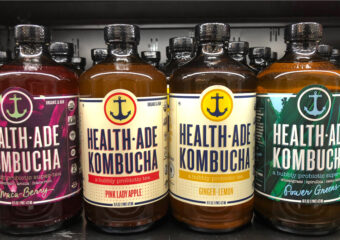Can Children Drink Kombucha? What Parents Should Know
Kombucha has been around for centuries but has recently gained popularity as a healthcare choice for people looking to improve their lifestyle. This fermented drink is often recommended for its benefits, especially for the probiotics it contains.
However, parents may wonder if it’s safe for their children to consume kombucha. While kombucha is generally accepted as safe for most people, there are some things to consider when giving it to toddlers and children.
Kombucha is a naturally fermented beverage that contains low-sugar content. However, because of the sugars used in the process, parents may want to limit the amounts consumed by their child. One option is diluting the kombucha with water or a low-sugar alternative to balance the sweetened flavour.
Key Considerations for Parents
When it comes to giving your children kombucha, there are a few key considerations to keep in mind to ensure their safety and health.
First and foremost, it is crucial to understand that children’s digestive systems are still developing, so introducing them to new foods and beverages should be done cautiously. While kombucha is generally considered safe for most people, including children, it may not be suitable for all kids.
One important consideration is the sugar content of the kombucha. Some commercially available kombucha beverages can be quite sweetened, which may not be ideal for children, especially those with a sensitive stomach or those prone to sugar highs and crashes. To address this, you can always dilute the kombucha with water or opt for low-sugar or fruit-flavored options.
Another factor to consider is the amount of probiotics present in the kombucha. While probiotics are beneficial for digestion and overall gut health, too much of them can sometimes upset the balance of the gut microbiome, especially in smaller children. It’s important to monitor how much kombucha your child is consuming and whether it is having any adverse effects on their digestion.
If you decide to introduce kombucha to your child, start with small amounts and observe how they react to it. Some children may love the taste right away, while others may need some time to acquire a taste for it. Be patient and give them the opportunity to learn to like it.
Ultimately, the choice of whether to give your child kombucha is up to you as a parent. If you are unsure whether it is the right option for your child, consult with a healthcare professional for guidance. Remember that there are always alternative beverage options available, so you can swap out kombucha for another drink if you’re not comfortable with your child consuming it.
In conclusion, kombucha can be a tasty and healthy choice for children, but it’s important to do your research and make an informed decision based on your child’s individual needs and preferences. By sourcing low-sugar and naturally flavored options, you can help your child stay healthy and enjoy a balanced lifestyle.
Health Benefits and Risks of Kombucha for Children
Kombucha is widely known for its health benefits, especially for adults who are looking to improve their gut health and overall well-being. But what about children? Is it safe for them to drink kombucha?
Benefits for Children
Kombucha can be beneficial for children as well. It contains probiotics that can help support their digestive systems and promote overall gut health. The live cultures in kombucha can also help boost their immune systems, especially during times when they may be more susceptible to illnesses. Additionally, kombucha is a natural and low-sugar option for children who want something tasty to drink.
There are also options available for children, such as kombucha that is specially formulated for toddlers or children. These options are usually sweeter and milder in flavour, making them more appealing to young taste buds.
Risks and Considerations
While kombucha can be beneficial for children, there are some risks and considerations to keep in mind. Kombucha contains small amounts of alcohol, which may not be suitable for younger children. It’s always best to consult with a healthcare professional before giving kombucha to your child, especially if they have any health issues or are taking medication.
Some children may not enjoy the taste of kombucha, especially if they are used to sweeter drinks. In this case, you can try diluting the kombucha with water or juice to make it more palatable for them. You can also try giving them kombucha during snack time or as a treat, rather than as a regular beverage.
When introducing kombucha to children, start with small amounts and monitor their reaction. Some children may experience digestive issues or stomach upset if they consume too much kombucha at once. It’s best to start with just a few sips and see how they react before increasing the amount over time.
Overall, kombucha can be a tasty and beneficial beverage for children, especially when consumed in moderation and as part of a healthy lifestyle. Just remember to always choose low-sugar options and consult with a healthcare professional if you have any concerns about giving kombucha to your child.
Recommended Age for Consumption
When it comes to introducing kombucha to children, the recommended age for consumption can vary. While some experts suggest that children as young as one year old can safely consume small amounts of kombucha, others recommend waiting until children are older, around four or five years old, before introducing them to this fermented drink.
The key consideration when determining the recommended age for children to drink kombucha is the caffeine content. Kombucha naturally contains small amounts of caffeine, which can affect children differently than adults. It’s important to consider your child’s tolerance to caffeine and their overall health before allowing them to consume kombucha.
However, if you want to introduce your child to kombucha at an early age, there are some tips to keep in mind. For example, you can start by diluting the kombucha with water or mixing it with fruit juice to make it more palatable for young taste buds. You can also choose kombucha brands that have lower sugar content to ensure that your child isn’t consuming too much sugar.
Another important factor to consider is the probiotics present in kombucha. Probiotics are beneficial bacteria that help maintain a healthy balance of gut flora. Children can benefit from consuming probiotics, but it’s important to introduce them gradually to avoid any digestive issues.
Overall, the recommended age for children to drink kombucha is a personal decision that should be made based on your child’s individual health needs and tolerance to caffeine. If you’re unsure whether kombucha is a suitable choice for your child, it’s always best to consult with a healthcare professional.
Toddlers And Kombucha: A Tasty Choice With Lower Sugars
When it comes to beverages for your child, there are many options to choose from. While soda and sugary fruit juices may be popular choices, they are not always the healthiest ones. That’s where kombucha comes in as a delicious and nutritious alternative.
Kombucha is a naturally fermented drink that is full of probiotics, which are good bacteria that support digestion and immune systems. It’s a drink that is being more accepted into mainstream lifestyle because of its many health benefits.
One of the best things about kombucha is that it is naturally low in sugars. Unlike sodas and other sugary beverages, kombucha is typically lower in sugar, making it a great choice for children, especially toddlers. This lower amount of sugar helps children to stay balanced and avoid the sugar highs and crashes that can come from consuming too much sugar.
Another benefit of kombucha is that it is a great way to introduce children to new flavors. Kombucha comes in a variety of fruity and sweetened options, making it a delicious choice for kids. For example, “Buchi” is a brand of kombucha that offers fruity flavors like cherry, chocolate, and even cake, which kids may find more appealing than traditional kombucha flavors.
It’s always important to check the labels when giving kombucha to children, as some brands may contain higher amounts of sugar than others. It’s also recommended to start with small amounts and gradually increase the serving size to see how your child responds to it.
Overall, kombucha can be a great option for children, especially toddlers, as long as it is consumed in moderation and as part of a balanced diet. It can be a refreshing and tasty drink that offers many health benefits without the excess sugars found in other beverages like soda.
Is Kombucha Safe for Children?
When it comes to sourcing kombucha for children, it is important to choose a brand that is recommended by healthcare professionals. There are many options available in the world of kombucha, but not all of them may be accepted for children. As a parent, it is important to do your research before starting your child on kombucha.
Kombucha does offer health benefits, as it contains small amounts of beneficial bacteria and yeast due to the fermentation process. However, it is also important to note that while kombucha can be beneficial for some, too much can be harmful. Children should consume kombucha in moderation, as excessive amounts can lead to negative health effects.
One important thing to consider is the sugar content in kombucha. Some varieties can be quite sweet, similar to a fruity soda or even a chocolate cake. It is then best to choose lower sugar options when giving kombucha to children. It is also wise to check the labels for the sugar content and choose brands that are lower in sugar. Children may enjoy the fruity flavors of kombucha, making it a more appealing choice than soda or other sugary drinks.
Health Benefits of Kombucha for Children
- Kombucha can be beneficial for digestion in children.
- The probiotics in kombucha can help boost the immune system.
- Kombucha contains antioxidants that are good for overall health.
While kombucha can offer health benefits to children, it is always important to consult with a healthcare professional before introducing it into their diet. Some children may have underlying health issues that could be exacerbated by kombucha. It is also important to consider whether a child really needs kombucha in their diet, as there are many other food and drink options that can provide the same health benefits.






